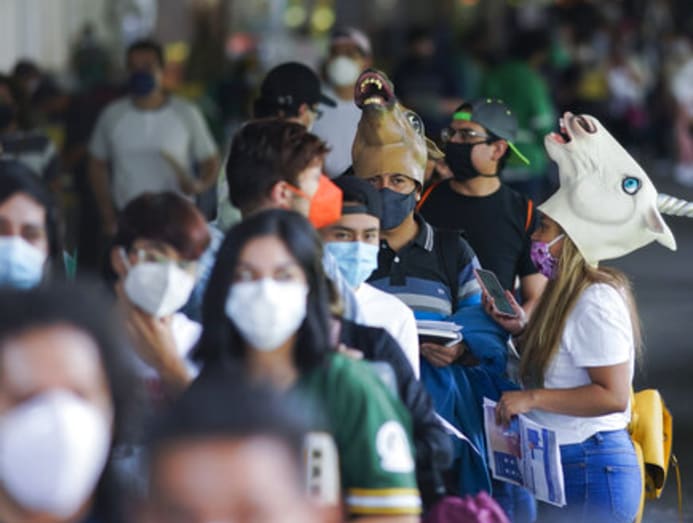Commentary: You’re less likely to get long COVID if you’re vaccinated
SYDNEY: Increasing COVID-19 vaccination rates as quickly as possible is currently a major focus for Commonwealth of australia.
Doing so has clear benefits in reducing new infections and preventing astringent disease, hospitalisation and expiry.
One question which is frequently asked is – does COVID-19 vaccination prevent you lot from getting long COVID?
HOW MANY PEOPLE Get LONG COVID-19?
There has been much international debate as to the definition of long COVID, how common it is, and how long it may last.
Studies examining the frequency of long COVID range from anywhere to over eighty per cent in hospitalised patients with severe initial disease, to as low as 2 to 3 per cent in one large app-based study of largely young healthy people in the Great britain.
A contempo review of 45 studies and near ten,000 people suggested nearly 75 per cent of them reported at least ane persistent symptom at 12 or more weeks after COVID-xix infection.
Many of these studies are highly dependent on the pick of people studied, and whether they required a definite confirmation past positive swab testing.
Will a vaccine mandate accost plateauing vaccination rates? Two infectious disease experts counterbalance in on Eye of the Matter:
An Australian report my colleagues and I led enrolled people who'd had confirmed positive PCR tests, also every bit a mix of hospitalised people and those who didn't become to hospital.
It found effectually one-third of people had persistent symptoms at an average of two to three months after infection.
The most common symptoms were persistent fatigue, shortness of breath and breast tightness, although a variety of other symptoms were as well reported. These findings are in keeping with about of the evolving enquiry which documents a wide variety of long COVID-19 symptoms.
One review published in August involving 15 studies and more than 47,000 people detailed upward to 55 dissever symptoms involving all torso systems and organs. The v most common were fatigue, shortness of breath, palpitations, brain fog and loss of smell.
The various nature of long COVID symptoms makes a clear definition hard. The World Health Arrangement is currently attempting to achieve a consensus agreement from its members. Expect to see further tweaks to this definition every bit it evolves.
VACCINATION REDUCES Adventure OF LONG COVID
Vaccination doesn't prevent all COVID-19 infections. "Breakthrough" infections in fully vaccinated people have been estimated to occur in a small proportion of people.
Breakthrough infections are more likely to have few or no symptoms, and are associated with lower levels of the SARS-CoV-2 virus.
Is this important in preventing long COVID? The answer is probably yes.
Currently our agreement of what causes or predicts long COVID is limited, not to the lowest degree because it's probably a "catch all" definition for several different conditions with underlying causes.
In most studies, there were ii principal predictors of getting long COVID.
One was the severity of the initial illness, and the second, if y'all were a woman.
The first of these is very likely to be impacted by vaccination and a recent study published in The Lancet medical periodical gives weight to this statement. It looked at symptoms reported after vaccination among users of the COVID-xix Symptom Study app in the United kingdom.
More than one.2 million users of the app reported at least ane vaccine dose and around 900,000 had two doses. A pocket-sized proportion, less than 1 per cent, of each of these groups subsequently developed COVID-19 infection and tracked their symptoms.
The written report found vaccinated people had a much-reduced risk of being hospitalised or having multiple symptoms in the first week of infection.
Chiefly, the likelihood of having a long elapsing of symptoms (over 28 days) was approximately halved.
This would clearly be expected to translate into a lesser number of people with long COVID at 12 weeks and across, although data confirming this is shortly defective.

And then, vaccination has benefit in limiting both severe astute COVID-19 infection and long COVID.
Further RESEARCH NEEDED
A word of caution though – long COVID appears to have a variety of triggers and many people suffering this condition didn't have an initial severe disease. Long COVID also appears to exist more than common in females and this association remains unexplained.
If the virus does trigger a long-lasting abnormal allowed response in some people, information technology'southward too soon to empathise whether this can still occur after breakthrough infection mail-vaccination.
Further research is urgently needed to understand the reasons for long COVID and direct potential treatments.
In the meantime, the likely result of vaccination in reducing the adventure of long COVID is nonetheless another reason for us to roll up our sleeves.
Gail Matthews is Infectious Diseases Physician and Program Head, Therapeutic Research and Vaccine Programme at The Kirby Institute, UNSW. This commentary first appeared on The Conversation.
Source: https://cnalifestyle.channelnewsasia.com/commentary/coronavirus-covid-19-long-symptoms-who-vaccine-risk-illness-290741
0 Response to "Commentary: You’re less likely to get long COVID if you’re vaccinated"
Post a Comment